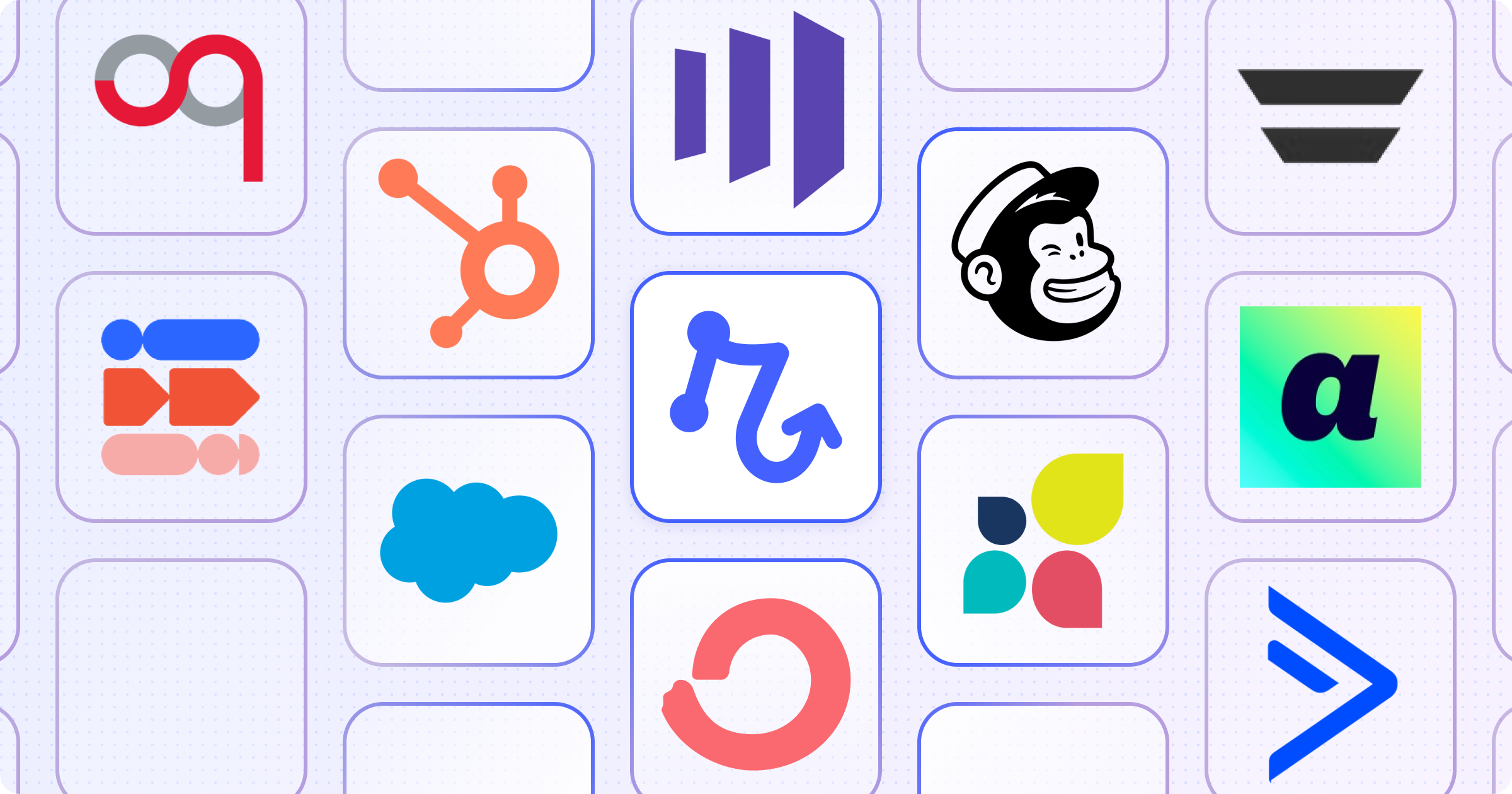
Every marketing team grapples with the same core challenges: limited time and resources.
We get this at Relay.app! With 11 employees—one of whom (me!) is in the marketing function—it takes some creative thinking and software help to get the job done.
Many marketing automation products make lofty promises. Few deliver the transformative results they advertise.
But the right tool really can elevate your marketing efforts—whether it’s automating repetitive tasks, enhancing customer engagement through personalized experiences, or simply automating email campaigns.
With that in mind, we’ve carefully curated a list of the best marketing automation software to help you distinguish the truly effective tools that'll actually impact your marketing ROI.
Here’s what we settled on:
- Relay.app for automated workflows with human decision-making.
- HubSpot for comprehensive inbound marketing and CRM.
- Mailchimp for startups and small businesses focused on email marketing.
- ActiveCampaign for advanced email marketing with CRM integration.
- Salesforce Pardot for B2B companies needing Salesforce integration.
- Marketo for large-scale, multi-channel campaign management.
- Eloqua for complex, customizable marketing automation.
- ActOn for versatile inbound and outbound marketing tools.
- Acoustic for data-driven personalization and actionable insights into campaigns.
- ConvertKit for content creators looking to automate marketing.
- Ortto for straightforward email and social media marketing.
- Autopilot for visual marketing automation.
What to look for in marketing automation software?
Choosing the right marketing automation software can seem daunting given the myriad options available. Here are the essential aspects to consider that will help streamline your marketing tasks, enhance the customer experience, and support your sales pipeline:
- Ease of use: Is the interface intuitive and user-friendly? Opt for software that your team can quickly master without extensive training, reducing the chance of human errors and increasing productivity.
- Integration capabilities: How well does the software integrate with tools you’re already using, such as CRM systems, social media platforms, and data analytics tools? Effective integration is crucial for a smoother workflow and better data synchronization, enhancing overall marketing efficiency.
- Customization: Does the software allow you to tailor processes and content to meet your specific marketing needs? From simple adjustments in email templates to complex workflow modifications, customization is key to optimizing your marketing efforts and improving customer engagement.
- Scalability: Can the software grow with your business? Whether you're a small startup or a large enterprise, you need a tool that can handle increased loads and scale operations as your company expands.
- Reporting and analytics: Are detailed analytics available to measure the effectiveness of your marketing campaigns? Ensure the software provides comprehensive reporting features that offer valuable insights into campaign performance, customer behaviors, and ROI, aiding you in making informed decisions.
- Customer support: Is reliable customer support available? It’s important, especially when you encounter issues or need help understanding features of the software. Check if the provider offers multiple support channels and resources like tutorials and forums.
- Compliance and security: Does the software comply with data privacy regulations relevant to your industry, such as GDPR for companies dealing with EU citizens? Ensure it has robust security features to protect your data from unauthorized access.
- Pricing: Pricing ranges differ greatly depending on the tool. Make sure the pricing approach of your respective tool aligns with your expectations and budget.
By carefully considering these factors, you can choose a marketing automation software that not only fits your current needs but also supports your long-term business goals.
The 12 Best Marketing Automation Software in 2024
1. Relay.app
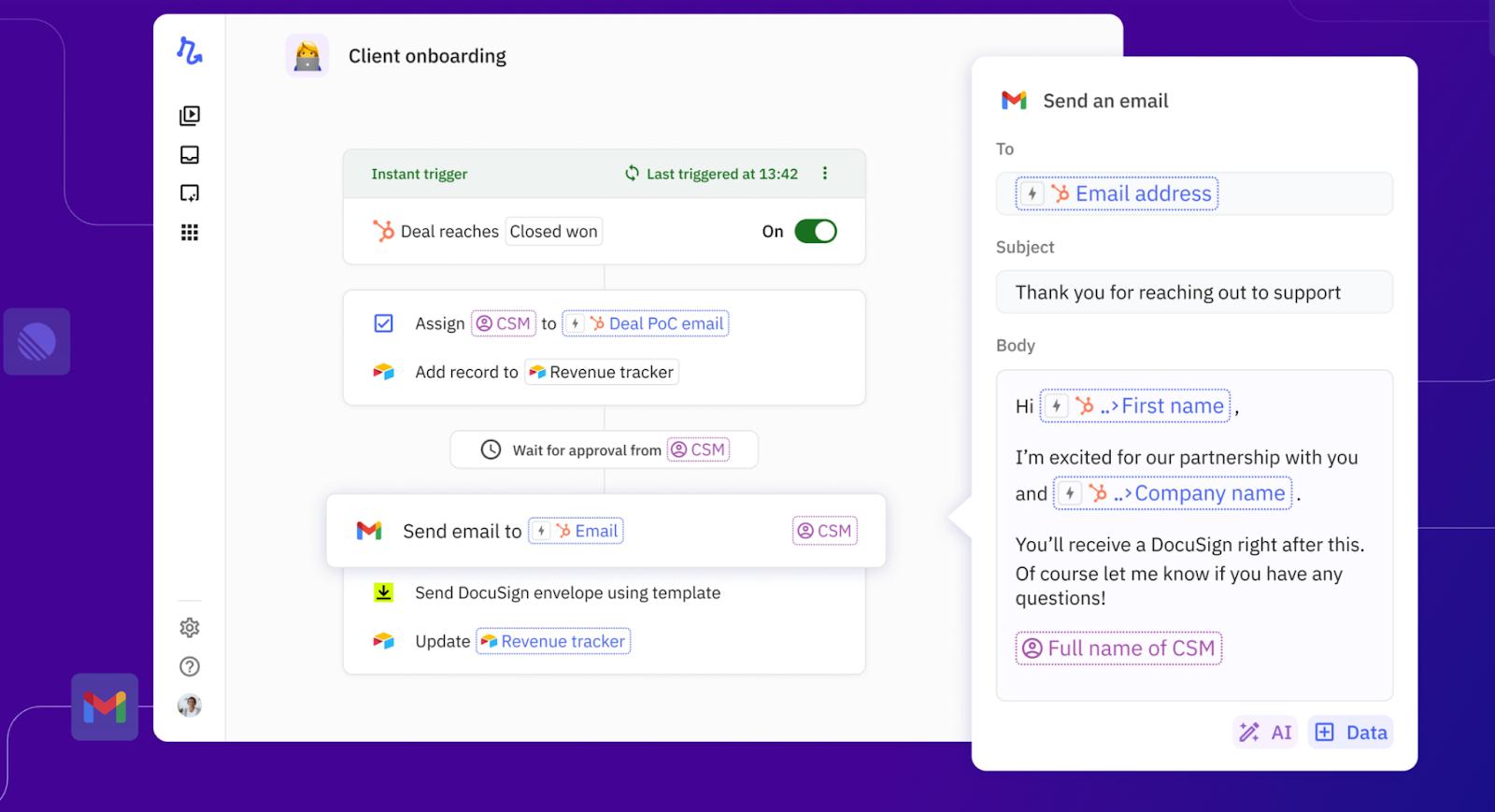
Okay! Okay! Relay.app isn't marketing automation software in the traditional sense, and it's definitely not an all-in-one marketing platform.
But it's automation software, and it's dang good at what it does.
Relay.app isn't going to fully replace a tool like HubSpot (it will integrate with it, though!), but it will allow teams who don't quite need a full marketing automation platform to automate... marketing!
Whereas marketing tools are limited to working with other marketing tools, Relay.app lets you automate with whatever tools you like—from project management tools like Asana and ClickUp to scheduling tools like Calendly to sharing updates with your CS team on Zendesk.
Here are a few examples of how you can use Relay.app automations and integrations:
- Email Campaigns: Link Relay.app with your email service to automate parts of your email marketing, like sending follow-up emails based on customer actions or triggering email sequences from other tools' actions.
- Lead Handling: Connect Relay.app to your CRM system to automate the flow of information between platforms, ensuring leads are nurtured without delays and with appropriate follow-ups.
- Customer Support Tickets: Use Relay.app to integrate your customer service platform with your CRM. This setup can trigger automatic ticket creation from customer feedback or inquiries on social media, ensuring that no customer query goes unnoticed and is routed to the right team quickly.
- Event Triggered Promotions: Set up Relay.app to monitor customer actions, such as signing up for a webinar or downloading a white paper. In response, Relay.app can trigger personalized promotions or send special discount codes to encourage further engagement.
- Feedback Collection: Automate the collection of feedback after a customer interaction or purchase. Relay.app can send out a survey link and then gather and store responses for analysis, helping you understand customer satisfaction and areas of improvement.
And with human in the loop, you can also look after decisions and approvals within those workflows. This feature ensures that while much of the process is automated, critical decisions still get that human touch, combining efficiency with personal oversight.
With Relay.app you can build personalized workflows with your existing tools, making it a great choice for marketing and sales teams looking to extend the functionality of their tech stack without committing to a full-scale marketing software.
Sign up for free today.
Features:
- Integration with major platforms like HubSpot, Salesforce, and more
- Customizable workflows to match your team's needs
- Human in the loop capabilities for maintaining quality control
Pricing:
- Pricing is customized based on the scale of operations and specific needs of your team.
Pros and cons:
✅ Flexible tool for those not needing full marketing automation
✅ Enhances other tools rather than replacing them
❌ Not a stand-alone marketing automation solution
❌ May require a combination of tools for complete marketing automation needs
2. HubSpot
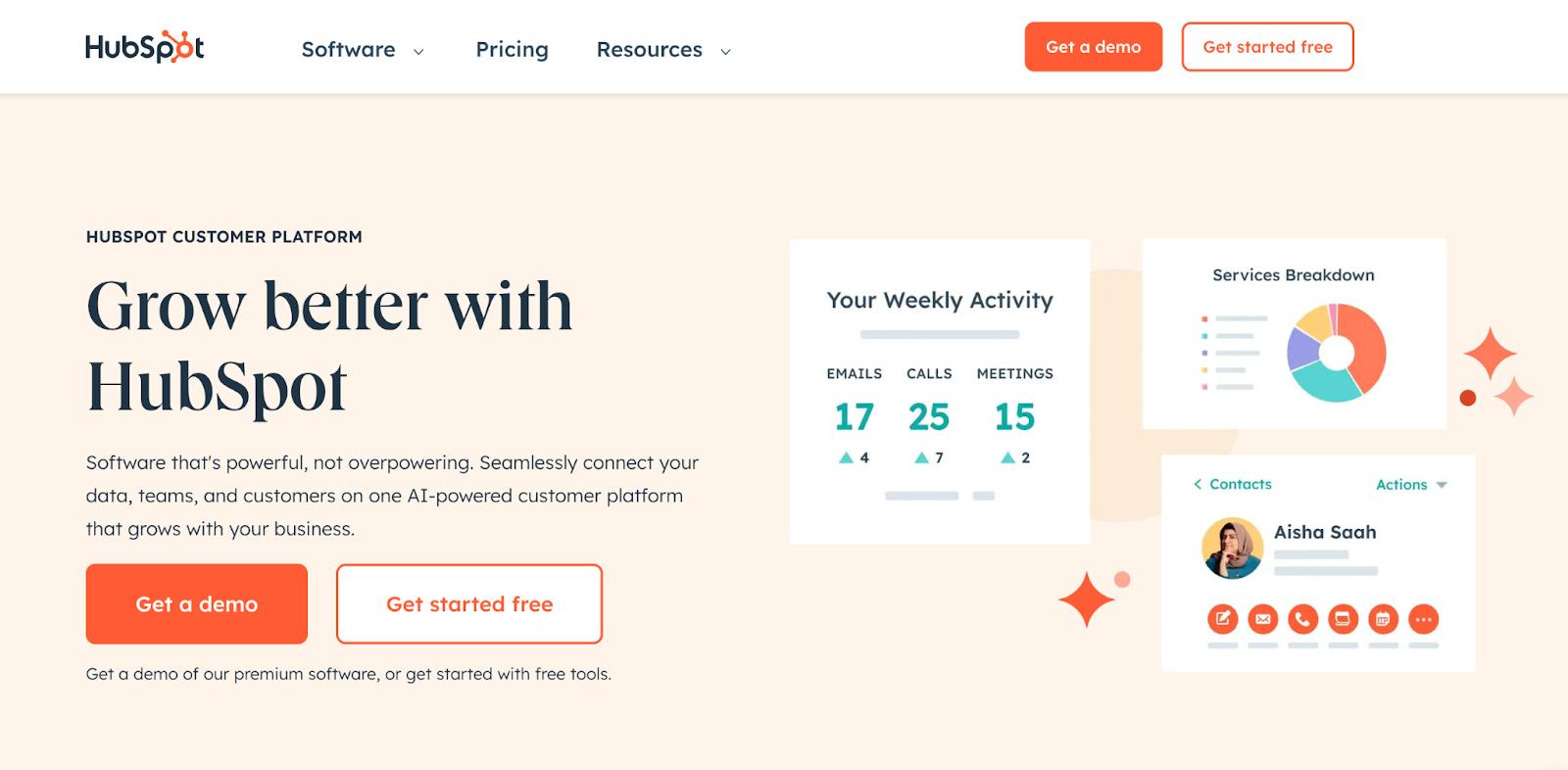
HubSpot Marketing Hub offers a comprehensive suite of tools that cover everything from CRM to email marketing, and automation, ideal for businesses looking to centralize their marketing efforts.
Features
- In-depth analytics and reporting
- Comprehensive CRM integration
- Customizable email templates and marketing automation workflows
Pricing
- Starter at $50/month
- Professional at $800/month
- Enterprise at $3,200/month
Pros and cons:
✅ Extensive integration options
✅ Powerful inbound marketing tools
❌ High cost for professional and enterprise levels
❌ Steep learning curve for new users
3. Mailchimp
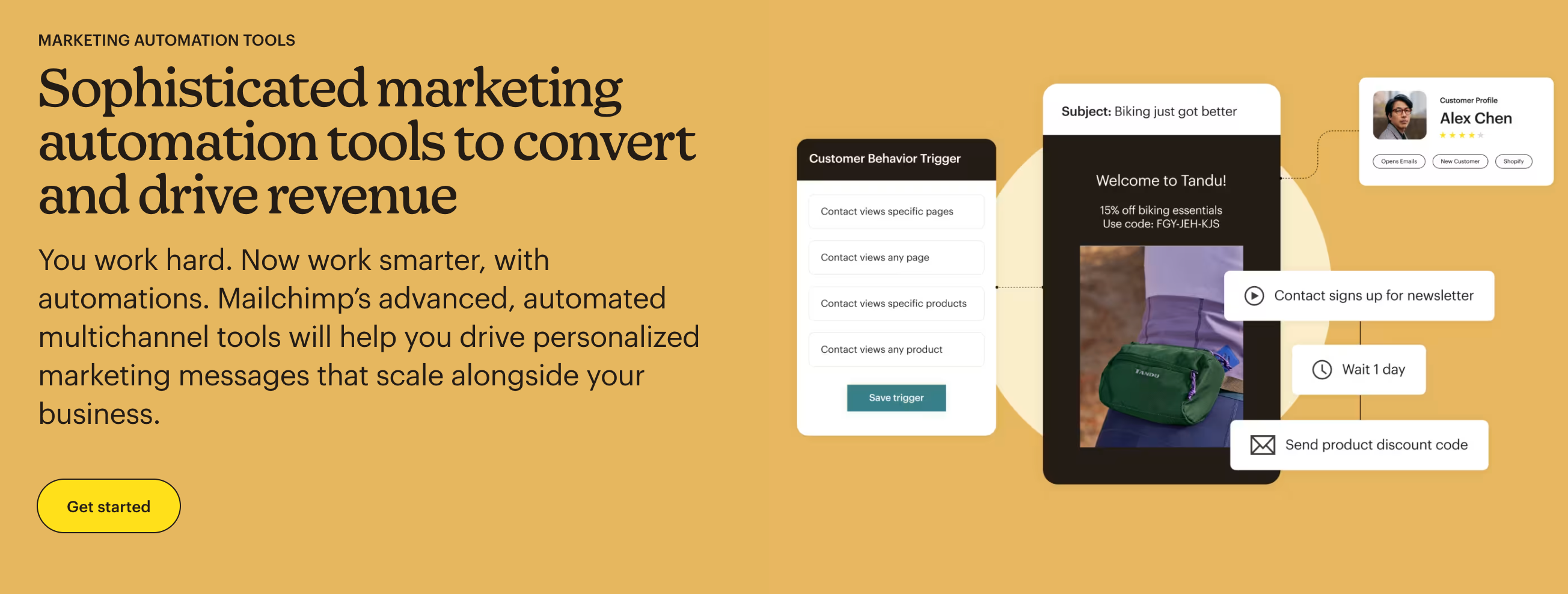
Mailchimp is well-known for its user-friendly email marketing tools, but it also offers features for automation across marketing channels—including SMS marketing.
Features:
- Advanced audience segmentation
- Multi-channel marketing automation
- Built-in analytics and performance reporting
Pricing
- Free for basic features
- Essentials at $11/month
- Standard at $17/month
- Premium at $299/month
Pros and cons:
✅ Free tier available for small businesses
✅ Intuitive interface and easy to use
❌ Limited automation capabilities in lower tiers
❌ Over-simplistic for complex marketing needs
4. ActiveCampaign
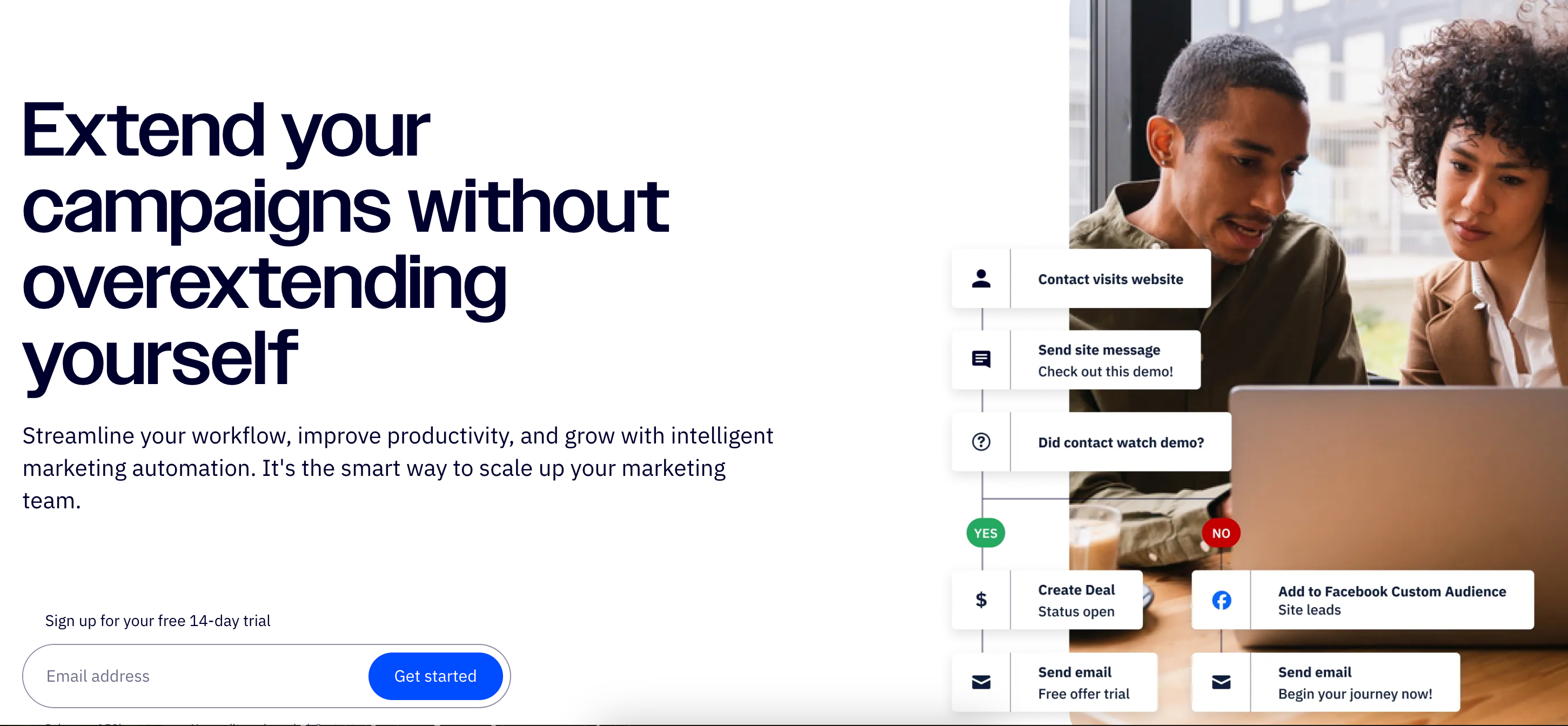
ActiveCampaign excels in email marketing automation tool, combining it with CRM functionalities to provide targeted marketing strategies based on customer data.
Features:
- Dynamic content and personalized emails
- Machine learning for optimized send times
- Integrated sales and CRM tools
Pricing:
- Lite at $15/month
- Plus at $70/month
- Professional at $159/month
- Enterprise pricing available on request
Pros and cons:
✅ Excellent for complex automation strategies
✅ High level of customization
❌ Can be costly for small businesses
❌ Interface may be complex for beginners
5. Salesforce Pardot
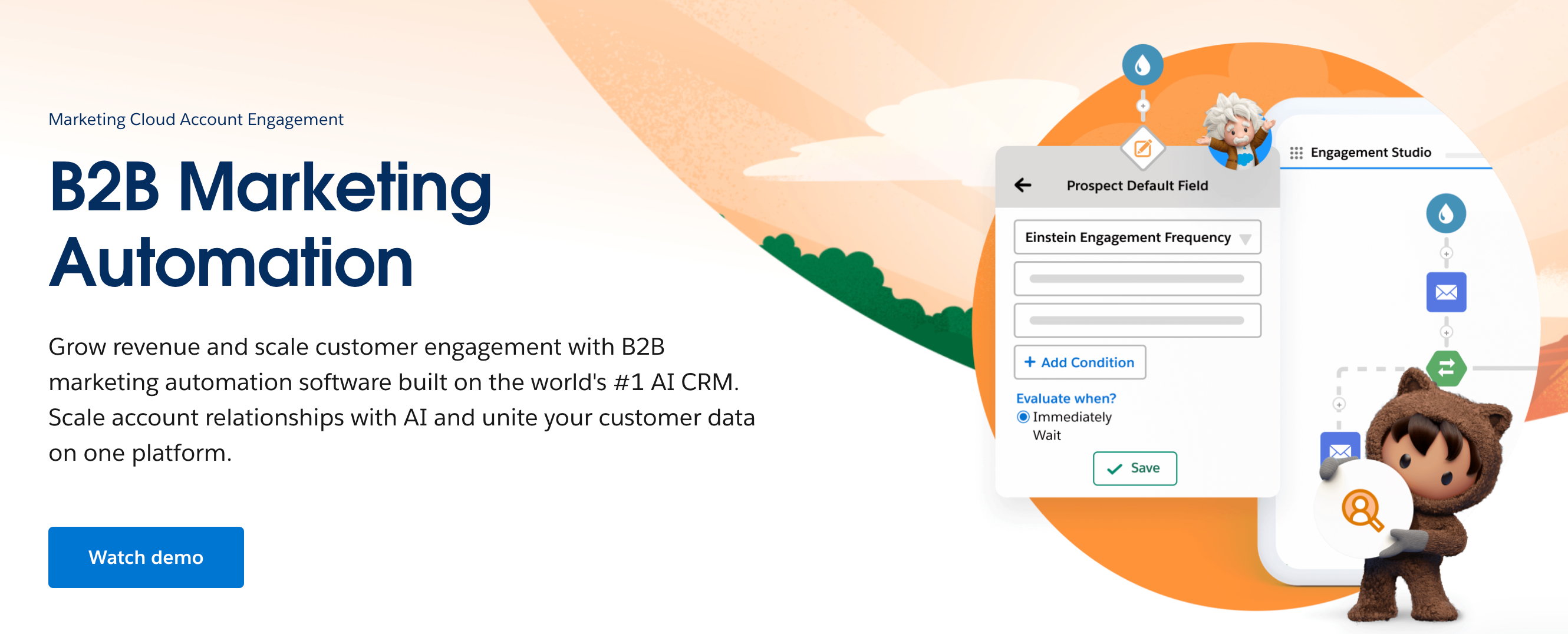
Salesforce Pardot offers a powerful B2B marketing automation solution integrated with Salesforce Marketing Cloud and its expansive CRM capabilities.
Features:
- Lead scoring and grading
- Advanced email marketing campaigns
- Comprehensive ROI reporting
Pricing:
- Growth at $1,250/month
- Plus at $2,500/month
- Advanced at $4,000/month
Pros and cons:
✅ Deep integration with Salesforce CRM
✅ Excellent for lead management
❌ Expensive for small to medium-sized businesses❌ Requires Salesforce ecosystem for optimal use
6. Marketo
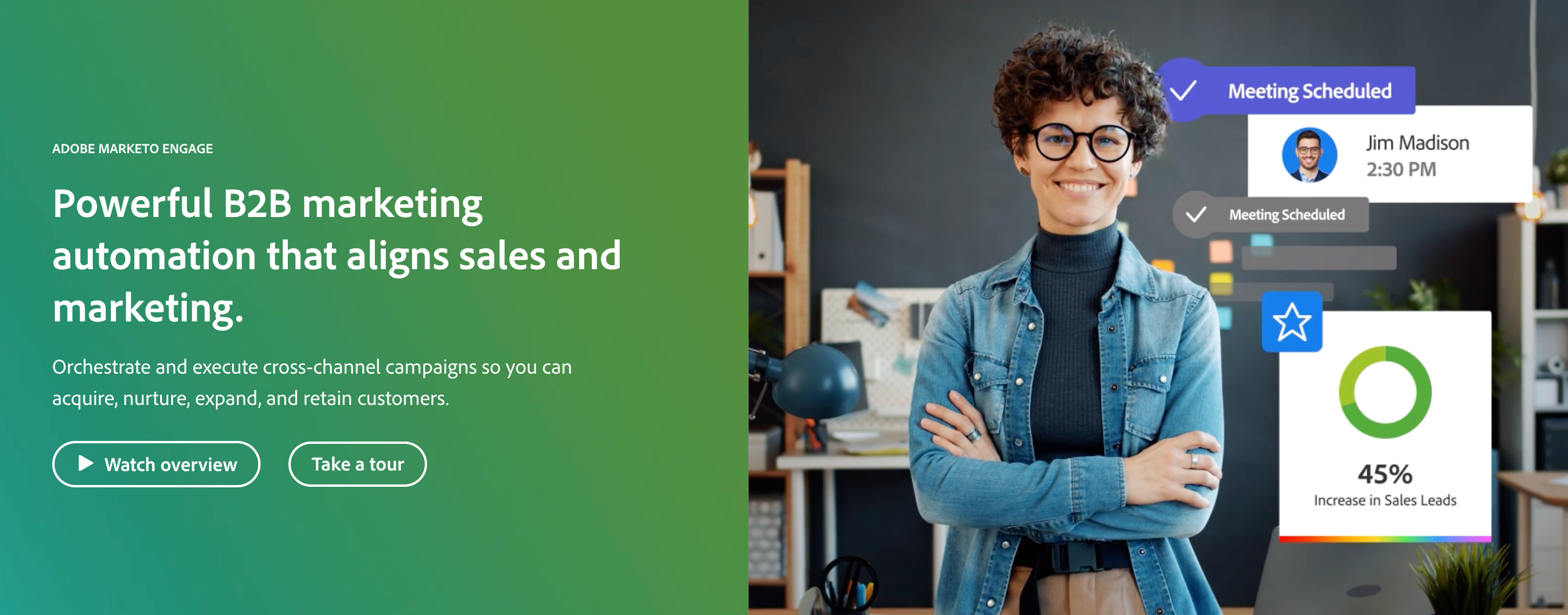
Adobe Marketo Engage (or just Marketo) is known for its scalable marketing automation solutions tailored to large enterprises and fast-growing businesses.
Features:
- Cross-channel campaign management
- Audience segmentation and targeting
- Extensive analytics and attribution models
Pricing:
- Pricing is customized based on the services and scale needed.
Pros and cons:
✅ Highly scalable for large operations
✅ Strong multi-channel support
❌ No clear pricing structure published
❌ May be too complex for small teams
7. Act-On
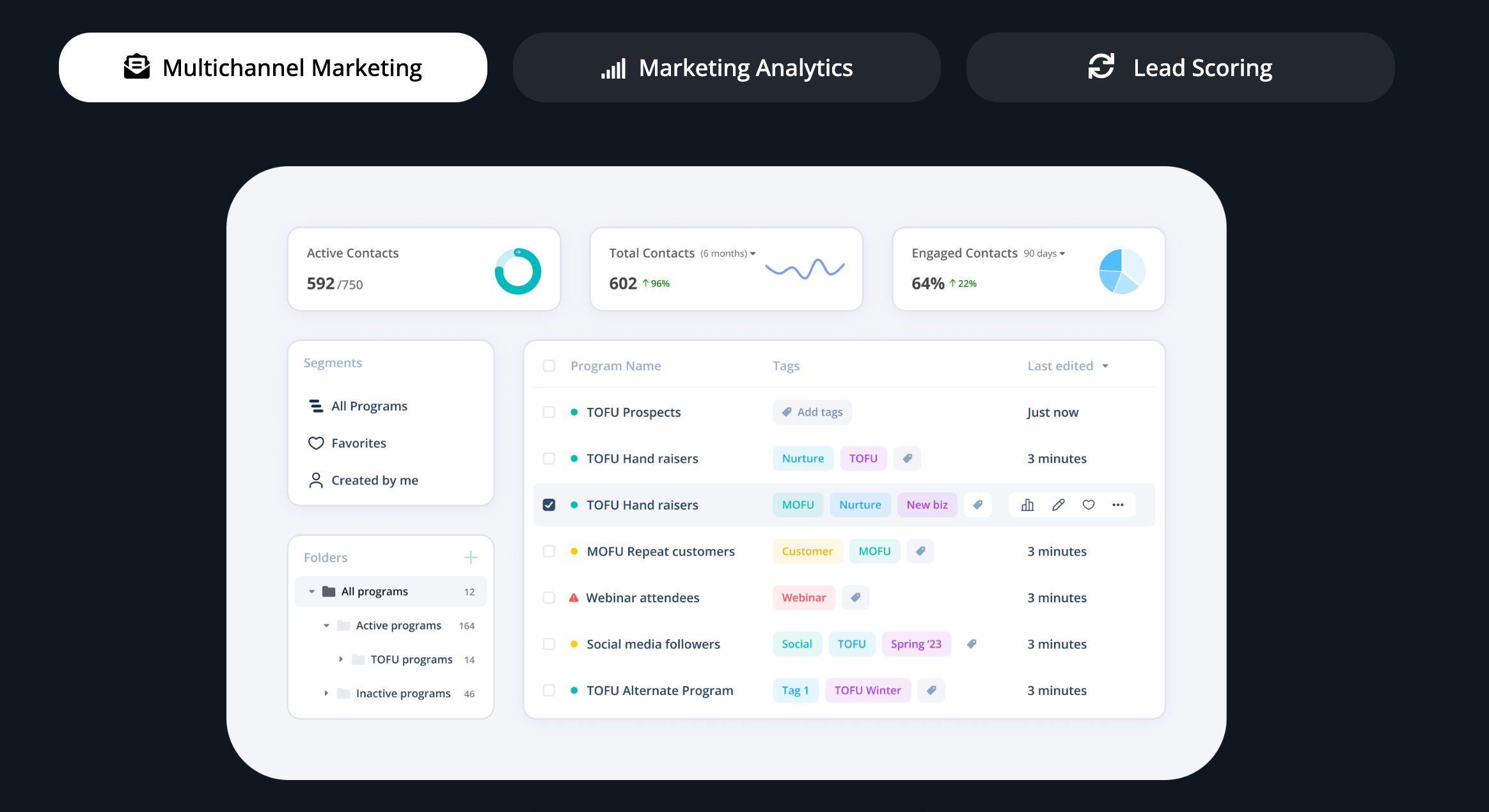
Act-On is designed for mid-sized businesses, offering tools that facilitate both inbound and outbound marketing strategies, simplifying automation across various platforms.
Features:
- Automate the entire customer journey
- SEO and content management tools
- Lead scoring and behavioral tracking
Pricing:
- Professional at $900/month
- Enterprise pricing available on request
Pros and cons:
✅ User-friendly interface for marketers
✅ Good customer support
❌ Features may be limited for larger enterprises
❌ Professional plan may be pricey for smaller businesses
8. Acoustic
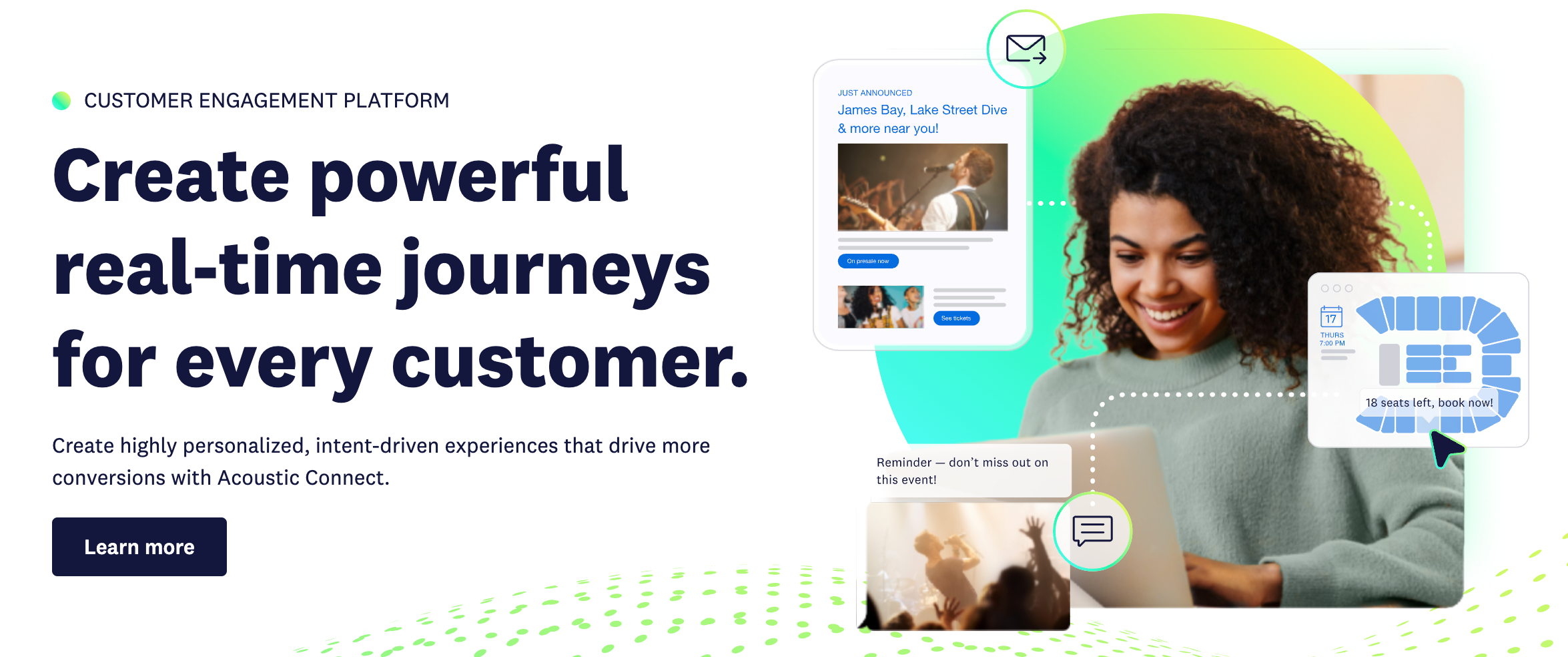
Acoustic provides marketing automation solutions that focus on personalization and campaign efficacy, suitable for businesses aiming to refine their marketing touchpoints.
Features:
- Behavioral data analytics tools
- Multi-channel campaign management
- Personalization engines
Pricing:
- Pricing details are available upon request.
Pros and cons:
✅ Strong focus on personalization and data insights
✅ Suitable for complex campaign management
❌ Pricing information is not transparent
❌ May have a steeper learning curve for newcomers
9. ConvertKit
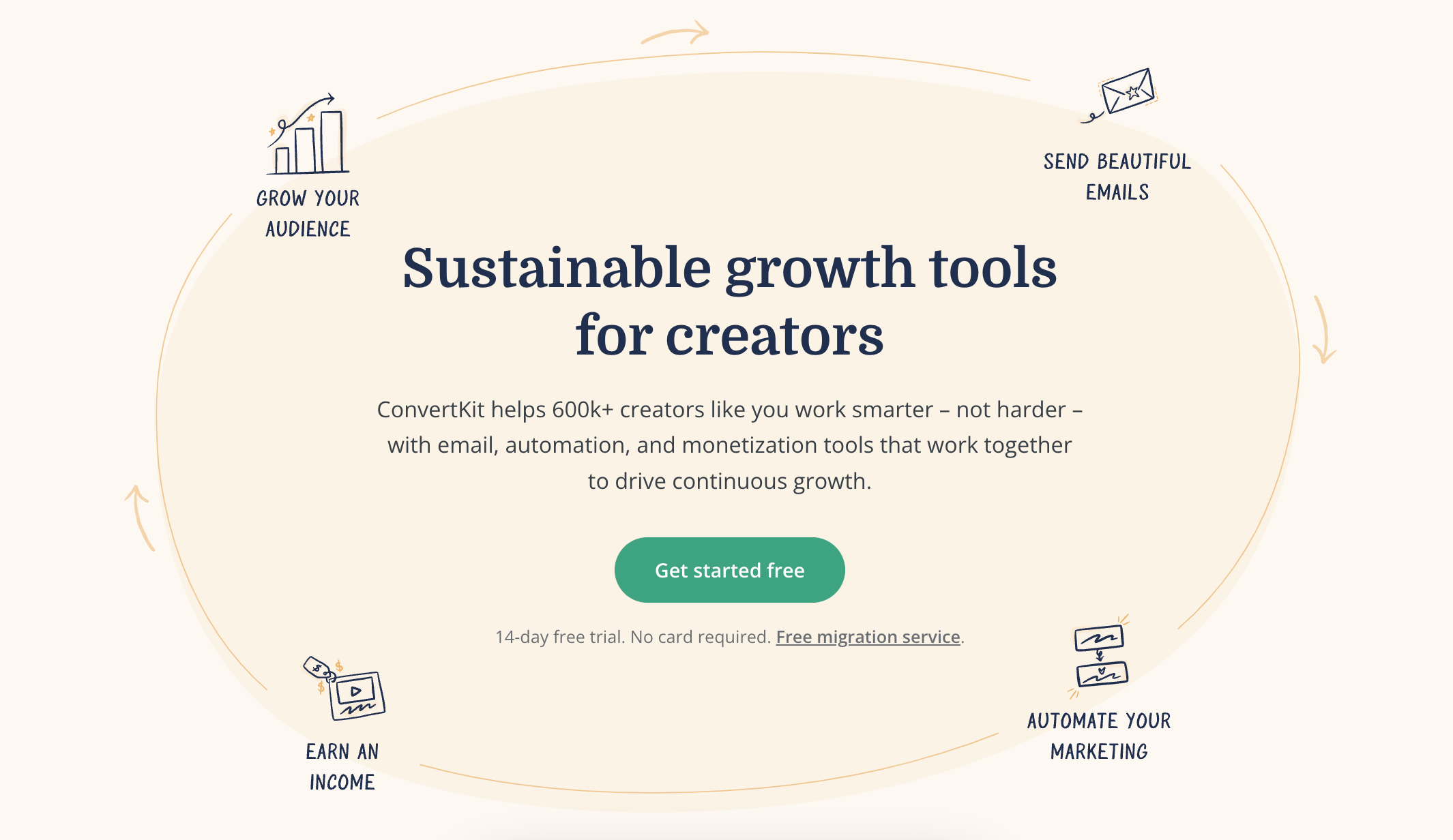
ConvertKit is ideal for content creators and small businesses, focusing on email marketing automation that helps grow their customer loyalty.
Features:
- Email signup forms and landing pages
- Email sequence automation
- Integration with e-commerce platforms for digital products
Pricing:
- Free for up to 1,000 subscribers
- Creator at $29/month
- Creator Pro at $59/month
Pros and cons:
✅ Excellent for bloggers and small online businesses
✅ User-friendly and easy to set up
❌ Limited functionality outside of email
❌ Not suited for large businesses or those with complex needs
10. Ortto
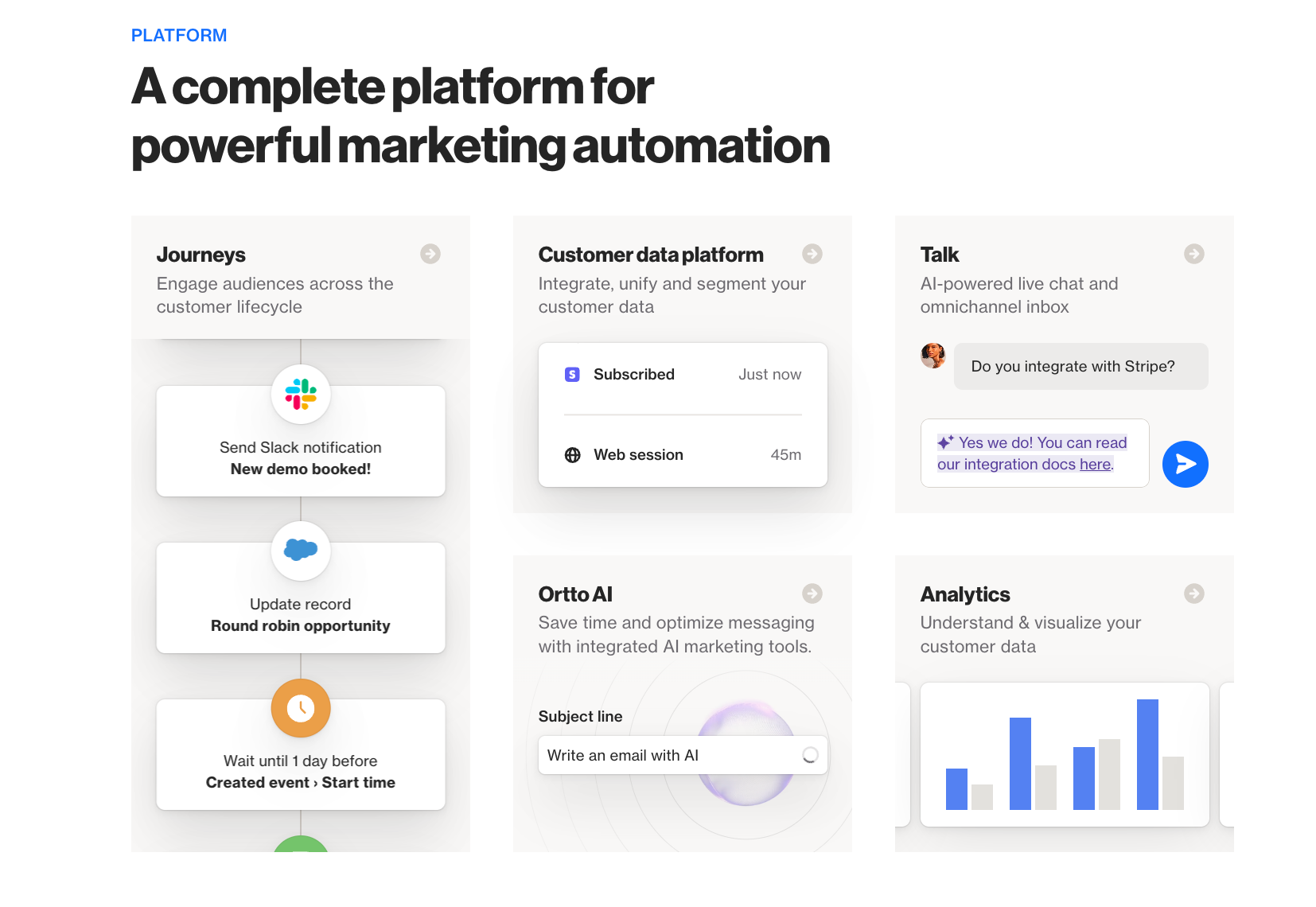
Ortto delivers marketing automation tools that are both powerful and accessible, with a focus on driving sales through targeted email campaigns and social media marketing.
Features:
- Dynamic email templates
- Social media integration
- Comprehensive reporting and analytics
Pricing:
- Starts at $99/month
- Custom plans available based on needs
Pros and cons:
✅ Affordable and straightforward pricing
✅ Good for small to medium-sized businesses
❌ Limited advanced features for larger enterprises
❌ Less known, smaller user community
11. Autopilot
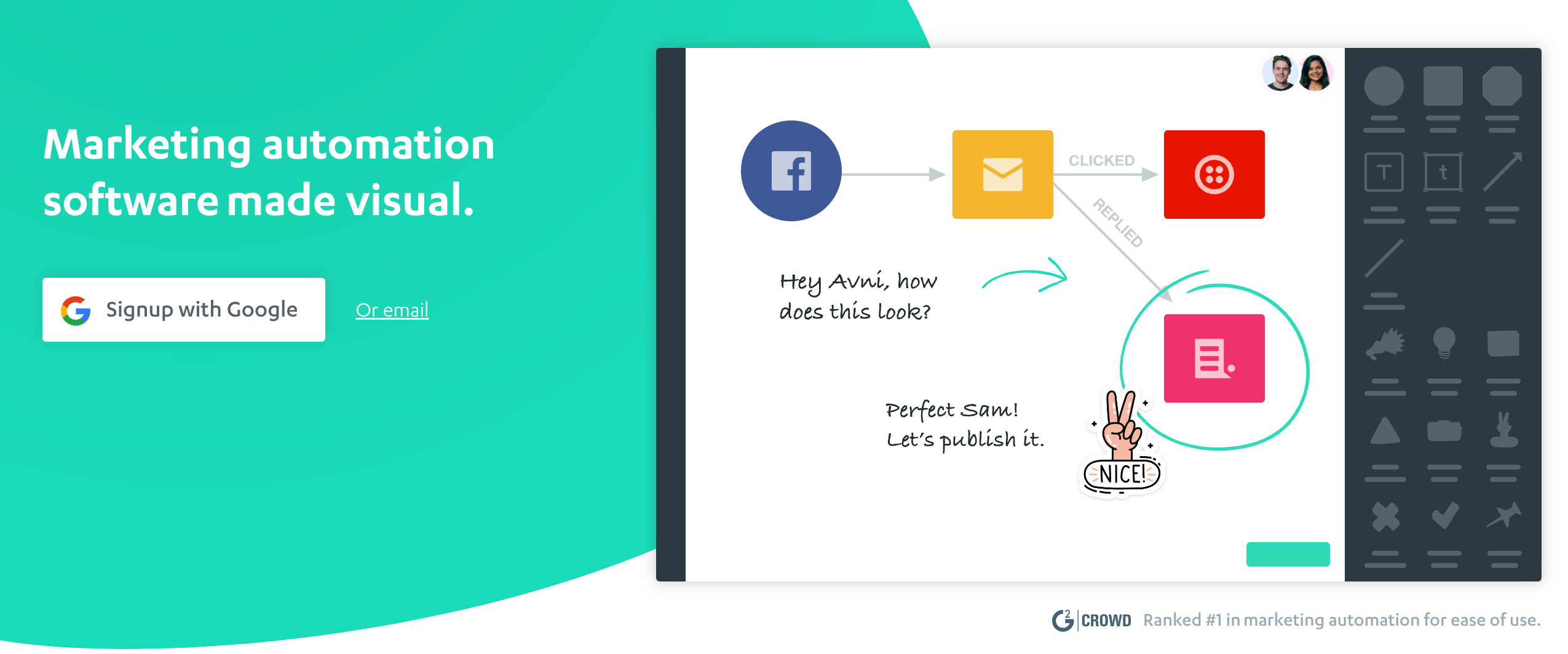
Autopilot offers a visual marketing automation platform that makes creating customer journeys as simple as drawing on a whiteboard.
Features:
- Visual journey builder
- SMS and email marketing tools
- Detailed activity logs and reporting
Pricing:
- Silver at $49/month
- Gold at $149/month
- Platinum pricing available on request
Pros and cons:
✅ Highly intuitive and visual interface
✅ Great for teams collaborating on campaigns
❌ Can become expensive as contact lists grow
❌ Limited integration options compared to competitors
12. Zoho Marketing Automation
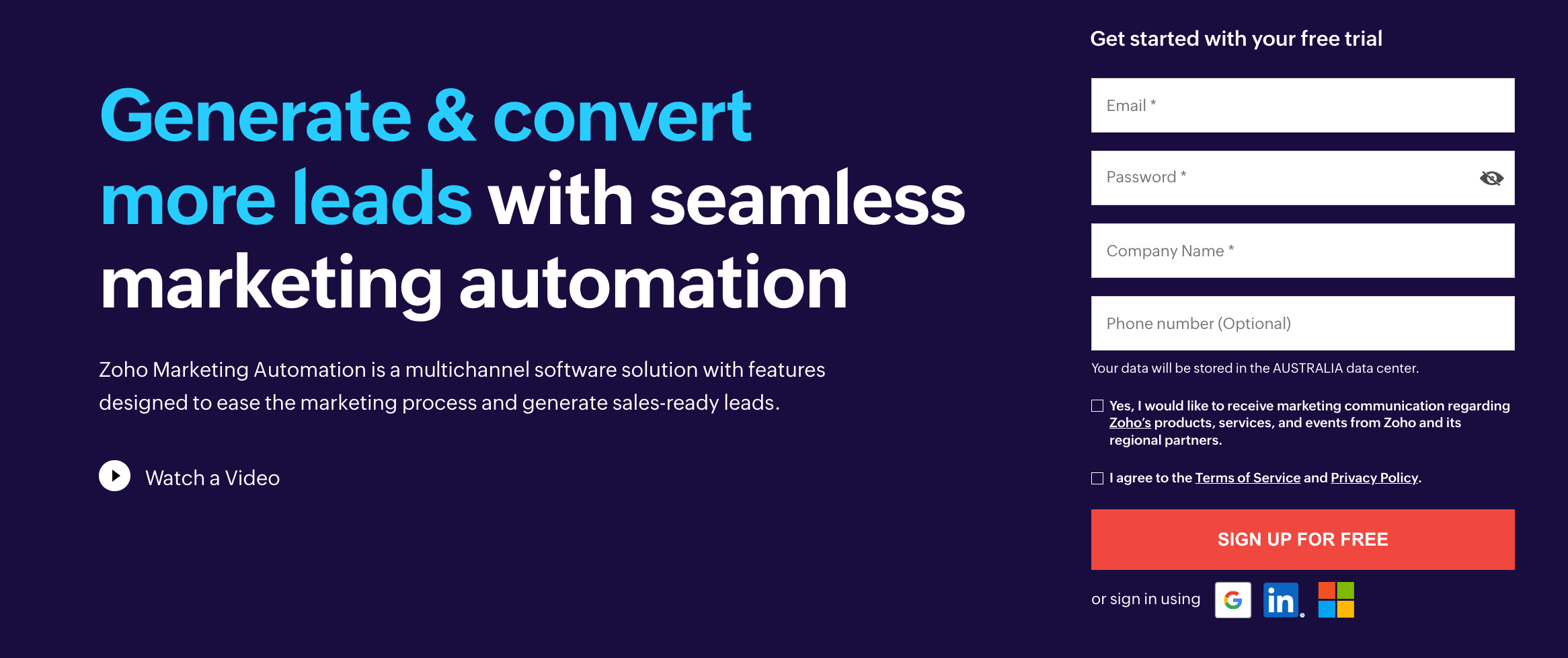
Zoho Marketing Automation provides a suite of marketing tools designed to assist businesses in attracting visitors, converting leads, and managing comprehensive marketing campaigns.
Features:
- Multi-channel marketing (email, social media, webinars, and events)
- Lead management and scoring
- Advanced web behavior analytics and tracking
- Marketing performance analytics
Pricing:
- Standard at $20/month
- Professional at $35/month
- Enterprise pricing available on request
Pros and cons:
✅ Integrates seamlessly with other Zoho products
✅ Offers a wide range of automation features across multiple channels
❌ Learning curve to fully utilize all features
❌ Makes most sense if you're in the Zoho ecosystem
_____________________
Related reading:

